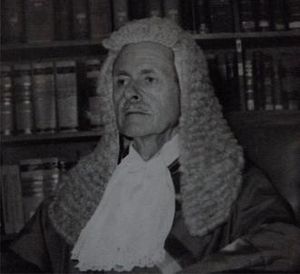James John Skinner facts for kids
James John Skinner (born July 24, 1923 – died October 21, 2008) was an important lawyer and politician. He was born in Ireland but became a citizen of Zambia. He was the very first Minister of Justice for independent Zambia. He was also the only white person in Zambia's first government. Later, Skinner became the Chief Justice of Malawi, which is like the top judge in the country. He held this position from 1970 to 1985. After that, he worked as a special judge in England until he retired.
Contents
A Family of Lawyers
James John Skinner came from a family where many people worked in law. His grandfather and father were both solicitors, which are types of lawyers. His uncle, Leo Skinner, was also a solicitor and even became a politician in Ireland. James's cousin, Geraldine Skinner, was a barrister (another type of lawyer) and later became an ambassador. So, it seems that working with laws and justice was a family tradition!
Early Life and Education
James Skinner was born in July 1923 in a town called Clonmel in Ireland. He went to a school called Clongowes Wood College. After that, he studied at Trinity College Dublin. He then trained to become a lawyer and was officially allowed to practice law in Ireland in 1946. A few years later, he was also allowed to practice law in England.
Moving to Africa and Starting in Politics
In 1951, James Skinner moved to a country in Africa called Northern Rhodesia. This country later became independent and was renamed Zambia. He quickly became a lawyer there too.
Skinner believed strongly in fairness for everyone. He supported the rights of African people. In 1960, he joined a political party called the United National Independence Party (UNIP), which was mostly made up of African members. He became the party's legal advisor, helping them with legal matters.
Even though some white people in the colony didn't agree with him, Skinner continued to work for what he believed was right. In 1964, when Zambia became independent, he was elected to represent a part of Lusaka, the capital city. He became a very important lawyer, known as a Queen's Counsel. He also received an award from Ethiopia for his help in Zambia's independence.
James Skinner was part of Zambia's very first government. He was the country's main legal advisor, called the Attorney General, until 1967. Then, he became the Minister of Justice. In 1969, he was appointed the Chief Justice of Zambia, which meant he was the highest judge in the country.
A Difficult Decision and Resignation
James Skinner's time as Chief Justice in Zambia was short. He resigned after only six months. This happened because of a disagreement with the President, Kenneth Kaunda.
The issue was about some soldiers from a neighboring country, Angola. They were arrested in Zambia. Another judge had decided that the charges against them were not serious and dismissed the case. When this decision was reviewed by Chief Justice Skinner, he agreed with the other judge.
President Kaunda was not happy with this decision. He felt that the court, which had some white judges, was not supporting Zambia's interests. After the ruling, some of Kaunda's supporters protested at the court building. President Kaunda later apologized for the protests. However, Skinner felt he could no longer do his job fairly and independently. He decided to leave Zambia.
Later Life and Return to Ireland
After leaving Zambia, James Skinner moved to Malawi. In 1970, he became the Chief Justice of Malawi and served in that role for 15 years.
In 1985, Skinner returned to England. He worked there as a special judge, helping people with appeals about social security. His job was to make sure that legal decisions were clear and easy for everyone to understand. He retired at the age of 72.
James John Skinner passed away in October 2008 at the age of 85. His ashes were buried in Clonmel, Ireland, where he was born.
Important Ideas from James Skinner
James Skinner believed strongly in the importance of fair justice for everyone. Here are some of his ideas:
- He said that judges must be free to make decisions without anyone telling them what to do. This means the government or public opinion should not influence their choices.
- He believed that when people go to court, they should always get justice. He said that everyone should be treated equally by the courts, no matter their background or beliefs.
- Skinner also thought it was very important for people to have a lawyer to defend them in court. He said that denying someone a lawyer would hurt fairness and progress in society.
- He believed that judges should sometimes criticize the government if needed. This helps make sure the courts can do their job properly.
- He once said, "Confidence in the Judiciary is a delicate bloom in Africa." This means that trust in the justice system is precious and needs to be protected carefully.
 | Kyle Baker |
 | Joseph Yoakum |
 | Laura Wheeler Waring |
 | Henry Ossawa Tanner |


